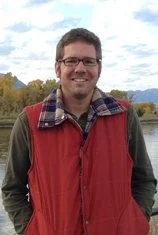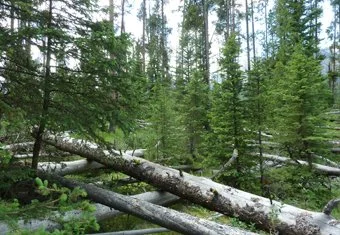Brian Harvey
Managing for resistance and resilience during a period of accelerating tree mortality in Rocky Mountain subalpine forests
Abstract
Climate change and altered disturbance regimes (e.g., drought, insect outbreaks, wildfires) are rapidly changing forest ecosystems in ways that will fundamentally challenge forest conservation and management over the next century. Subalpine forests in western North America are of high conservation value because they provide critical wildlife habitat, water resources, carbon storage, and recreational opportunities. However, the future of these forests is uncertain following widespread and severe bark beetle outbreaks [primarily mountain pine beetle (Dendroctonus ponderosae) and spruce beetle (Dendroctonus rufipennis) in lodgepole pine (Pinus contorta) and Engelmann spruce (Picea engelmannii) trees, respectively] in recent decades. Subalpine forest trajectories will depend largely on survival of subalpine fir (Abies lasiocarpa), the primary tree species not attacked in recent outbreaks. Yet, subalpine fir has experienced escalating mortality since the mid-1990s across the US Rocky Mountains. The causes of this mortality and consequences for subalpine forest integrity are largely unknown, but such information is critical for designing and successfully achieving conservation goals in the face of novel climate and disturbance combinations.
In my project, I will combine a long-term dataset on tree demography (e.g., establishment, growth, and mortality on >6,000 individual trees) with satellite/aerial imagery, climate data, and forest simulation modeling to better understand the causes and consequences of accelerating rates of tree mortality in the subalpine forest zone of the US Central Rocky Mountains. I will combine multi-scale (individual tree to forest landscape) measurements and analyses to [1] examine the spatio-temporal patterns of recent subalpine fir mortality and relationships with causal mechanisms, [2] evaluate effects of recent tree mortality on future forest trajectories and susceptibility to disturbance, and [3] test the effect of management treatments on fostering ecological resistance and resilience. This work is being completed in collaboration with regional forest managers, and I will facilitate transfer of findings through workshops, field trips, and multimedia outreach. Finally, I will broaden diversity in the ecological sciences by involving young scientists from underrepresented groups.
Mentors
Dr. Thomas Veblen at University of Colorado and Drs. José F. Negrón and Mike Battaglia at USDA Forest Service
Undergraduate Education
B.A., Environmental Studies, University of California, Santa Barbara, 2003
Graduate Education
M.A., Geography; Resource Management and Environmental Planning, San Francisco State University, 2010
Ph.D., Ecosystem and Landscape Ecology, University of Wisconsin-Madison, 2014
Current Title and Affiliation
Associate Professor at the University of Washington



